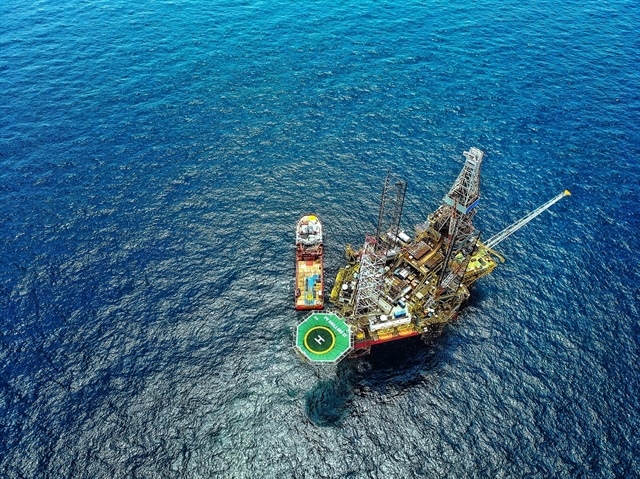Frontier Vietnam yearns for emerging-market rank at MSCI
Frontier Vietnam yearns for emerging-market rank at MSCI
Vietnam is building its case for an upgrade to emerging-market status at MSCI Inc. to draw more international investors to a stock market one-tenth the of Singapore’s.

The State Securities Commission has formed a team to study what’s required for an upgrade of the nation’s frontier-market classification, Nguyen Son, the commission’s head of market development, said in an interview. Investors with about $9.5 trillion of assets use indexes compiled by New York-based MSCI to measure performance.
The Southeast Asian country already plans to combine its two exchanges, reduce foreign-ownership limits and sell shares in state-owned companies to bolster the $60 billion market. Benchmark equity gauges in Qatar (DSM) and the United Arab Emirates (ADSMI) jumped at least 38 percent in 12 months after MSCI said in June 2013 they would be raised to emerging-market status.
“It’ll be a huge opportunity if we get upgraded,” Michael Kokalari, a Ho Chi Minh City-based analyst at CIMB Securities International Ltd., said by phone on Sept. 29. “The universe of the index would be much, much bigger.”
MSCI isn’t currently reviewing Vietnam’s market classification, said Chin-Ping Chia, a managing director at the index provider in Hong Kong. An emerging-market ranking requires “significant” openness to foreign ownership and ease of capital flows, as well as minimum levels of liquidity and market-capitalization, according to MSCI’s website.
Ownership Limits
Emerging markets in MSCI indexes have an average market capitalization of about $564 billion, versus about $30 billion for those in the frontier gauge. The latter measure has advanced 18 percent this year, versus a 21 percent gain for Vietnam’s benchmark VN Index. (VNINDEX) The Vietnamese gauge rose 0.5 percent at 10:05 a.m. local time, heading for the highest close since Sept. 19.
MSCI probably won’t consider Vietnam for an upgrade unless the country eases its foreign ownership limits, Thomas Hugger, the chief executive officer at Hong Kong-based Asia Frontier Capital, wrote in an e-mail. Overseas holdings in several of Vietnam’s biggest companies have reached the legal limit of 49 percent, making it difficult for international investors to buy all the shares they want.
The Ministry of Finance submitted a plan to Prime Minister Nguyen Tan Dung in November that recommended lifting the limit on foreigners’ holdings of voting shares in some industries to 60 percent. The government is still working on the proposal, the SSC’s Son said.
Five-Year Process
“Foreign investors need significant access to the local market,” Hugger wrote.
For the U.A.E. and Qatar, the latest markets to win an upgrade into the emerging markets index, the five-year review process paid off. Abu Dhabi’s ADX General Index has advanced 44 percent since the upgrade was announced, boosting the value of its stock market by $33.5 billion, according to data compiled by Bloomberg. Dubai’s DFM General Index has more than doubled over the same period, while Qatar’s QE Index jumped 47 percent. That compares with a 4.2 percent gain in the MSCI Emerging Markets Index.
Qatari stocks have attracted a record $2.3 billion in foreign capital this year, while Dubai has lured about $1.35 billion since May 21, a week before the upgrade took effect.
In Vietnam, foreign inflows are “below potential,” Tran Van Dung, chairman and chief executive officer at the Hanoi Stock Exchange, said in an interview on Sept. 23.
Exchange Merger
While international investors have been net buyers of Vietnamese stocks for almost nine straight years, inflows through yesterday totaled just $227.5 million. That compares with $4.2 billion into Indonesia and $1.3 billion into the Philippines, which are classified as emerging markets at MSCI.
Regulators are working to complete a plan to merge the Ho Chi Minh City and Hanoi Stock Exchanges, according to Son.
The average daily value of shares changing hands on the Ho Chi Minh exchange this year through yesterday was about 2.1 trillion dong ($99 million), compared with $521 million in Indonesia and about $837 million in Singapore, data compiled by Bloomberg show.
While Vietnam’s privatization program has lagged targets this year amid investor concerns that the companies don’t start trading on the exchange soon enough after their initial public offerings, Prime Minister Nguyen Tan Dung last month issued a decision pushing companies to list shares faster.
“A key to attract more foreign investment is a real reform of the banking industry, restructuring of state-owned enterprises sector and opening up of foreign ownership levels,” said James Bannan, who runs the $140 million Frontier Markets Fund at Coeli Asset Management in Malmoe, Sweden.
bloomberg


























